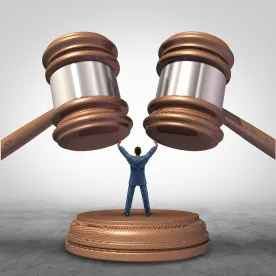The United States Supreme Court heard a one-hour consolidated oral argument in three arbitration cases involving the intersection of the National Labor Relations Act and the Federal Arbitration Act on October 2, 2017. Epic Systems Corp. v. Lewis, No. 16-285; National Labor Relations Board v. Murphy Oil USA, No. 16-307; Ernst & Young LLP v. Morris, No. 16-300. The argument was the first of the Court’s 2017-2018 term.
Arbitration agreements requiring employees to waive their right to bring or participate in a class or collective action have long been enforced pursuant to the Federal Arbitration Act. In the three cases heard on October 2, the Court is asked to resolve a split among the U.S. Courts of Appeals (Fifth, Seventh, and Ninth Circuits) over whether such arbitration agreements violate employees’ rights under the National Labor Relations Act to engage in “concerted activities” in pursuit of their “mutual aid or protection.”
The Court’s decision is expected to provide welcome certainty to both employers and employees on the issue of class waivers in arbitration agreements.
During the argument, four justices (Justices Ruth Bader Ginsburg, Stephen Breyer, Sonia Sotomayor, and Elena Kagan) asked attorney Paul Clement (representing all three employers in the argument) and Deputy Solicitor General Jeffrey Wall (representing the U.S. government’s position) questions suggesting it is their view that these types of arbitration agreements are irreconcilable with the NLRA. Conversely, Chief Justice John Roberts and Justice Samuel Alito asked questions suggesting that they hold the opposite view. National Labor Relations Board General Counsel Richard Griffin argued on behalf of the agency. Justice Anthony Kennedy noted during his questioning of Griffin that employees could still engage in protected concerted activity if they collectively funneled resources and information to a single attorney who could represent each employee in an individually-initiated arbitration proceeding initiated individually. Justices Clarence Thomas and Neil Gorsuch did not ask any questions.
While one cannot predict the outcome or its timing with any certainty, a decision is expected in early 2018.









 />i
/>i
